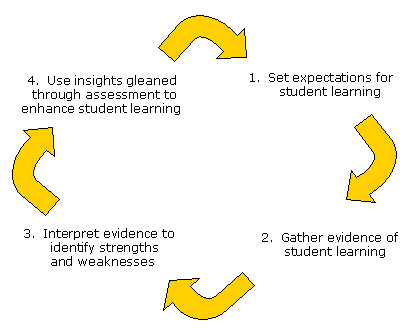In light of current federal expectations for documenting educational effectiveness, there is broad consensus within today’s higher education community that emphasis must be placed on transforming the academy into a “culture of evidence.” Within assessment contexts, this “outcomes” orientation has led to process being as important as product. Even the most successful academic programs can benefit from an ongoing process of inquiry and reflection that focuses on growth, renewal, and continuous improvement. Assessing student learning is linked inextricably to the teaching-learning process as part of the “feedback loop” that can enhance institutional efficacy (see Figure 1). The coherence of this loop constitutes a critical component for determining educational effectiveness based on the Western Association of Schools and Colleges’ (WASC) current accrediting standards. (Learn more about UCLA’s recent reaccreditation process ).
Figure 1. The Outcomes Assessment Feedback Loop

The distinguishing feature of outcomes assessment at the department/program level is that it addresses student learning across multiple courses in the curriculum. Assessment activities are geared toward determining the extent to which students completing the program can demonstrate proficiency on expected “learning outcomes.” This approach also links campuses to their external stakeholders by providing evidence of accountability and enabling programs to demonstrate student learning. Two questions lie at the heart of outcomes assessment: Are students learning what faculty want them to learn? and Are faculty learning from that? In other words, how are faculty using the findings from their assessment efforts to enhance student learning?
What does this mean for UCLA faculty?
In accordance with WASC accreditation expectations, UCLA is required to show that faculty who are responsible for each undergraduate major have:
- established core student learning outcomes for the major (#1 in Figure 1)
- developed plans for assessing students’ achievement of learning outcomes (#2 and #3 in Figure 1); and
- used assessment findings (as applicable given the timing of the program’s next 8-year Academic Senate Review) to enrich the curriculum review and development process in the interest of improving undergraduate student learning (#4 in Figure 1)
New accreditation-related requirements for documenting and assessing student learning outcomes are now a fact of academic life not only for those of us at UCLA, but at all colleges and universities across the country. While accrediting bodies like WASC are responsible for ensuring that campuses provide evidence of student learning and for reviewing campus accomplishments in this realm, they do not mandate a focus on particular learning outcomes, nor do they dictate what assessment methods should be used. Those decisions are left to individual academic units.
It is also important to remember that the focus here is on the entire program; individual students, faculty, or courses are not the point of emphasis, nor is the goal to seek out problems and assign blame. Rather, the overarching goal is to identify program strengths and areas of concern and to use insights gleaned through the assessment process to inform discussions about pedagogical or curricular changes. It is not necessary to assess every learning outcome in every student every year. Instead, faculty should develop a flexible, multi-year plan that can facilitate incremental program improvement.
Who is responsible for creating learning outcomes and assessment plans?
Conversations about the program’s learning outcomes should engage, as broadly as possible, those who are invested in the success of the program’s students, including students themselves. Faculty should work together to develop consensus on expected learning outcomes, curriculum alignment, and assessment, and they should collaborate to determine the implications of results. This requires collegiality, trust, and flexibility, and it requires program faculty to regularly discuss student learning both with colleagues and with students. These conversations are an essential component of effective assessment. Other campus professionals are also available to consult on assessment plan development and implementation.
How can we engage students?
Engaging undergraduates in assessment-related aspects of their education can benefit students, faculty, and academic programs alike. Considerable research has shown that learning is enriched when students are encouraged to reflect in a structured way on their learning experiences, including: intended programmatic outcomes, what they are expected to learn within courses and through selected assignments, how program requirements are designed to help them succeed within their chosen field of study, and what constitutes excellent performance. Students can also offer valuable contributions in the processes of planning, implementing, and using assessment findings including participating in:
- identifying relevant assessment focal points and appropriate assessment strategies;
- designing or reviewing drafts of local assessment strategies and tools, as well as research externally-developed approaches;
- reviewing logistical plans for assessments with respect to their potential feasibility as well as their projected impact on students;
- identifying incentives for students to participate thoughtfully in “add-on” assessments (e.g., focus group interviews, surveys)
- identifying relevant assessment focal points and appropriate assessment strategies; and
- reviewing assessment results, discussing their implications, and advising on how to share results with students most effectively.
Graduate students – especially those who intend to pursue faculty careers, and who thus will inevitably need to engage in outcomes-based assessment efforts within their future academic departments – can also be meaningfully engaged in all aspects of this work.

